情态动词精讲
- 格式:doc
- 大小:64.50 KB
- 文档页数:14

常见情态动词讲解情态动词是一种特殊的动词,它不能单独作为谓语,必须和其他动词一起构成谓语。
情态动词没有人称和数的变化,后面必须跟动词原形。
2、常见的情态动词包括can、could、may、must、shall、should、need和would。
3、情态动词的用法主要包括:询问能否帮忙,回答可以或不行。
用XXX询问某人是否能做某事,回答可以或不行。
询问是否可以借用某物,回答可以或不行。
询问是否可以在书上写字,回答不行。
用could或XXX请求帮忙,回答可以或肯定。
询问去动物园的路,请求指路。
询问是否可以进入某处,回答可以。
询问是否可以坐在某处,回答可以或不行。
询问是否可以喝可乐,回答可以。
用may、could或XXX询问是否可以和某人通话,回答正在通话中。
should和XXX表示劝告,如早起、不要玩电脑游戏等。
用should询问某人是否应该做某事,回答肯定或否定。
表示建议时可以用“你愿意…吗”来引导。
He said it was okay for me to smoke in the room。
Instead of using "may" to answer ns。
it's better to use phrases like "Yes。
please," "Certainly," "Please don't," "You'd better not," or "No。
you mustn't" XXX。
He might be at home。
but I'm not sure。
She may not be aware of this matter。
They could be having a meeting。
but I'm uncertain。

情态动词详解情态动词是英语语法中的重要组成部分,起到表达说话者的意愿、能力、可能性、推测等作用。
本文将详细解析情态动词的定义、特点和常见用法,帮助读者更好地理解和运用情态动词。
一、情态动词的定义及特点情态动词(Modal Verbs)是一类特殊的助动词,用来表达情感、态度、推测、条件、意愿、建议、能力、必要性等。
情态动词有以下几个特点:1. 情态动词没有人称和数的变化,即不论主语是第一人称、第二人称还是第三人称,情态动词的形式不变;2. 情态动词后面直接接动词原形,不加“to”;3. 情态动词没有时态和语态的变化,即不论句子时态如何,情态动词的形式不变;4. 情态动词没有完成式,因此无法在句子中出现“have + 过去分词”的结构。
二、常见情态动词及其用法下面是常见的情态动词及其用法的详细解析:1. Can“Can”表示能力、许可和可能性。
能力:用于表达某人在某方面具有的能力或技能。
例句:He can speak three languages.许可:用于征求或给予许可。
例句:Can I borrow your pen, please?可能性:用于表达可能发生的情况。
例句:It can rain tomorrow.2. Could“Could”是Can的过去式,表示过去或虚拟条件下的能力、许可和可能性。
能力(过去):用于表达过去具备的能力或技能。
例句:When I was young, I could run very fast.许可(过去):用于过去征求或给予许可。
例句:Could I use your phone yesterday?可能性(虚拟条件):用于表示虚拟情况下的可能性。
例句:If I had enough money, I could travel around the world.3. May“May”表示允许、可能性、祝愿和推测。
允许:用于征求或给予许可。
例句:May I come in?可能性:用于表达主观推测的可能性。

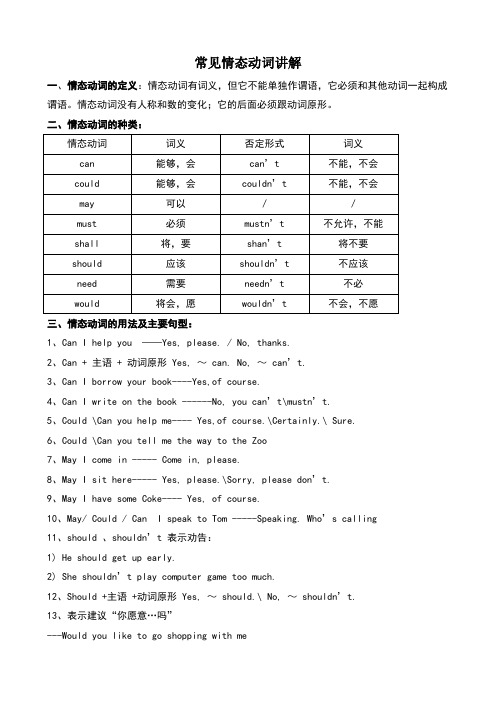
常见情态动词讲解一、情态动词的定义:情态动词有词义,但它不能单独作谓语,它必须和其他动词一起构成谓语。
情态动词没有人称和数的变化;它的后面必须跟动词原形。
二、情态动词的种类:三、情态动词的用法及主要句型:1、Can I help you ——Yes, please. / No, thanks.2、Can + 主语 + 动词原形 Yes, ~ can. No, ~can’t.3、Can I borrow your book----Yes,of course.4、Can I write on the book ------No, you can’t\mustn’t.5、Could \Can you help me---- Yes,of course.\Certainly.\ Sure.6、Could \Can you tell me the way to the Zoo7、May I come in ----- Come in, please.8、May I sit here----- Yes, please.\Sorry, please don’t.9、May I have some Coke---- Yes, of course.10、May/ Could / Can I speak to Tom -----Speaking. Who’s calling11、should 、shouldn’t 表示劝告:1) He should get up early.2) She shouldn’t play computer game too much.12、Should +主语 +动词原形 Yes, ~ should.\ No, ~shouldn’t.13、表示建议“你愿意…吗”---Would you like to go shopping with me---Yes, I’d love to. /I’d love to. But I’m busy now.14、就餐用语Would you like something to eat\drink ----Yes, I’d like…15、shall用于第一人称(I, we), 可以表示“将”和表示建议“……好吗”1) Where shall we have dinner2) Shall we go fishing -----All right. \OK. \Good idea.16、Must + 主语 + 动词原形 ---Yes,~ must.\No, ~needn’t.四.常见情态动词的区别:1. can (could)1)表示能力,could主要指过去时间。
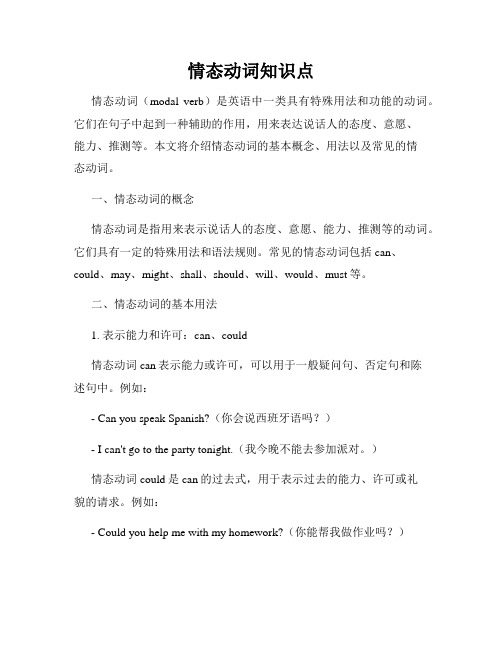
情态动词知识点情态动词(modal verb)是英语中一类具有特殊用法和功能的动词。
它们在句子中起到一种辅助的作用,用来表达说话人的态度、意愿、能力、推测等。
本文将介绍情态动词的基本概念、用法以及常见的情态动词。
一、情态动词的概念情态动词是指用来表示说话人的态度、意愿、能力、推测等的动词。
它们具有一定的特殊用法和语法规则。
常见的情态动词包括can、could、may、might、shall、should、will、would、must等。
二、情态动词的基本用法1. 表示能力和许可:can、could情态动词can表示能力或许可,可以用于一般疑问句、否定句和陈述句中。
例如:- Can you speak Spanish?(你会说西班牙语吗?)- I can't go to the party tonight.(我今晚不能去参加派对。
)情态动词could是can的过去式,用于表示过去的能力、许可或礼貌的请求。
例如:- Could you help me with my homework?(你能帮我做作业吗?)- She could run very fast when she was young.(她年轻时能跑得很快。
)2. 表示可能性和推测:may、might情态动词may和might用于表示可能性或推测,表示事物发生的可能性更大。
might的语气较虚弱,使用较少。
例如:- It may rain tomorrow, so take an umbrella with you.(明天可能会下雨,所以带把伞。
)- He might be busy.(他可能很忙。
)3. 表示义务和建议:shall、should情态动词shall用于第一人称和第三人称中,表示义务或将来的行为。
should用于各种人称中,表示建议或应该的动作。
例如:- Shall I open the window?(我应该打开窗户吗?)- You should eat more fruits and vegetables.(你应该多吃水果和蔬菜。
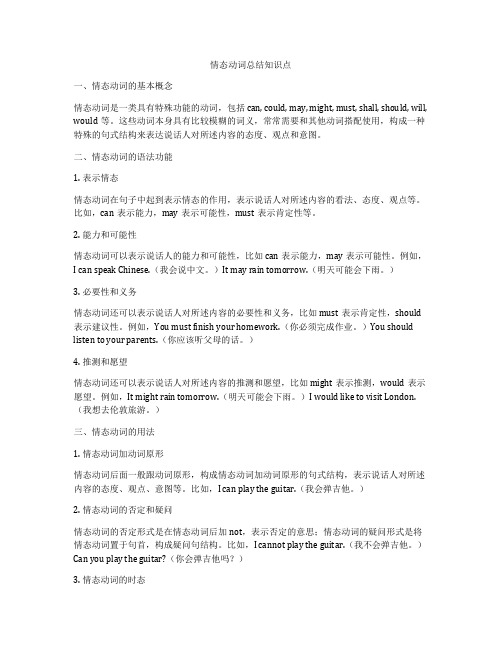
情态动词总结知识点一、情态动词的基本概念情态动词是一类具有特殊功能的动词,包括can, could, may, might, must, shall, should, will, would等。
这些动词本身具有比较模糊的词义,常常需要和其他动词搭配使用,构成一种特殊的句式结构来表达说话人对所述内容的态度、观点和意图。
二、情态动词的语法功能1. 表示情态情态动词在句子中起到表示情态的作用,表示说话人对所述内容的看法、态度、观点等。
比如,can表示能力,may表示可能性,must表示肯定性等。
2. 能力和可能性情态动词可以表示说话人的能力和可能性,比如can表示能力,may表示可能性。
例如,I can speak Chinese.(我会说中文。
)It may rain tomorrow.(明天可能会下雨。
)3. 必要性和义务情态动词还可以表示说话人对所述内容的必要性和义务,比如must表示肯定性,should 表示建议性。
例如,You must finish your homework.(你必须完成作业。
)You should listen to your parents.(你应该听父母的话。
)4. 推测和愿望情态动词还可以表示说话人对所述内容的推测和愿望,比如might表示推测,would表示愿望。
例如,It might rain tomorrow.(明天可能会下雨。
)I would like to visit London.(我想去伦敦旅游。
)三、情态动词的用法1. 情态动词加动词原形情态动词后面一般跟动词原形,构成情态动词加动词原形的句式结构,表示说话人对所述内容的态度、观点、意图等。
比如,I can play the guitar.(我会弹吉他。
)2. 情态动词的否定和疑问情态动词的否定形式是在情态动词后加not,表示否定的意思;情态动词的疑问形式是将情态动词置于句首,构成疑问句结构。
比如,I cannot play the guitar.(我不会弹吉他。

情态动词基础知识讲练情态动词有:can,may,will,shall,must,ought to,need,usedto,dare,be able to 和have to等。
情态动词大多一词多义,表示说话人对某种动作和状态的看法,但情态动词不能单独作谓语,一般只能和动词连用构成谓语。
部分情态动词有过去式,但没有人称和数的变化。
常见的几个情态动词的用法:1.can(过去式could)的用法:(1)表示能力、技能、功能等,意思是“能,能够,会”。
如:He can drive a car.他会开汽车。
She could speak French well when she was in college.在大学时,她法语讲得很好。
He coutdn't answer the question correctly.他不能正确回答这个问题。
(2)表示允许、请求、要求、建议等,意思是“可以”。
例如:You can go now.你可以走了。
Can I open the door for you?我能为你开门吗?He said we could take these magazines home.他说我们可以把这些杂志带回家。
(3)与could可以互换使用,表示可能性、机会, 意思是“可能,会”。
例如:Can the news be true?这消息会是真的吗? You could be right.你也许是对的。
(4)用could代替can,表示语气的婉转。
例如:Could you call me again at 8 this evening?你今晚8点再给我打电话好吗?(5)在表示能力时,与be able to意思基本相同,但be able to强调在特定条件下的特殊能力。
例如:No one was able to answer this question./No one could answer this question.没有人能回答这个问题。

情态动词的用法与辨析情态动词是英语语法中的一类特殊动词,用于表示说话人的意愿、能力、推测、建议等含义。
本文将对情态动词的用法和辨析进行详细介绍。
一、情态动词的定义和特点情态动词(modal verbs)是英语中一类特殊的动词,它们用来表达说话人的情感、意愿、能力、推测或建议等态度。
情态动词具有以下几个特点:1. 情态动词没有人称和数的变化。
它们在不同的人称和数上保持不变。
2. 情态动词后面接动词的原形(即不带to的动词原型)。
3. 情态动词没有现在分词和过去分词形式,也没有第三人称单数形式。
4. 情态动词本身不带有完整的时态意义,而是通过上下文来表示所需要的时态。
常见的情态动词有:can、could、may、might、must、shall、will、would、should等。
二、情态动词的用法1. 表示能力和可能性情态动词can表示能力和可能性。
例如:- She can play the piano.(她会弹钢琴。
)- I can help you with your homework.(我可以帮你做作业。
)情态动词may和might表示可能性。
例如:- It may rain tomorrow.(明天可能下雨。
)- He might be in his office.(他可能在办公室。
)2. 表示允许和禁止情态动词can和could表示允许,而情态动词must和mustn't则表示禁止。
例如:- You can use my computer if you need it.(如果你需要的话,可以用我的电脑。
)- You mustn't smoke in this area.(在这个区域不准吸烟。
)3. 表示推测和可能性情态动词may和might还可以表示推测和可能性。
例如:- He may be busy right now.(他现在可能很忙。
)- It might snow tonight.(今晚可能下雪。

情态动词英语语法知识精讲情态动词概述特征1情态动词modal verb本身有词义,表示说话人的语气或情态,但词义不完全,不能单独用作谓语动词,一般只能和动词原形一起构成谓语动词。
2情态动词所表示的情态有:命令、允诺、请求、拒绝、愿望、愿意、义务、必要、可能、能力、敢于、需要等。
3情态动词ought除外和助动词shall,will,should,would一样,后面的动词不定式一般皆不带。
形式变化1没有人称和数的变化,第三人称单数的现在时也无变化。
如:I can We canYou can You canHeThey canShe canIt2有些情态动词有过去式,有少数过去式和它的原形相同。
a有过去式的情态动词有:may -- wouldcan ―― couldmay―― nightshall -- shouldhave to -- had tob过去式不变的情态动词有:must - must 或had toought to - ought toneed---needdare - dare亦可用dared3大多数情态动词后面可用动词的进行式、完成式和被动形式,如:canmay,mustbe doing,canmay,must have done,canmay,mustbe done等。
否定式情态动词和助动词一样,后面可直接跟否定词not。
现将情态动词的否定式及其否定式的简略式简略式用于口语中列举如下:shall not--shan't [FB:nt]will not---won't [wEunt]can not-can't [kB:nt]must not-mustn't [5mQsnt]should not-- shouldn'twould not-- wouldn'tcould not-- couldn'tdare not- daren't [dZEnt]need not-- needn't在疑问句中的用法情态动词在疑问句中的用法和助动词相同。
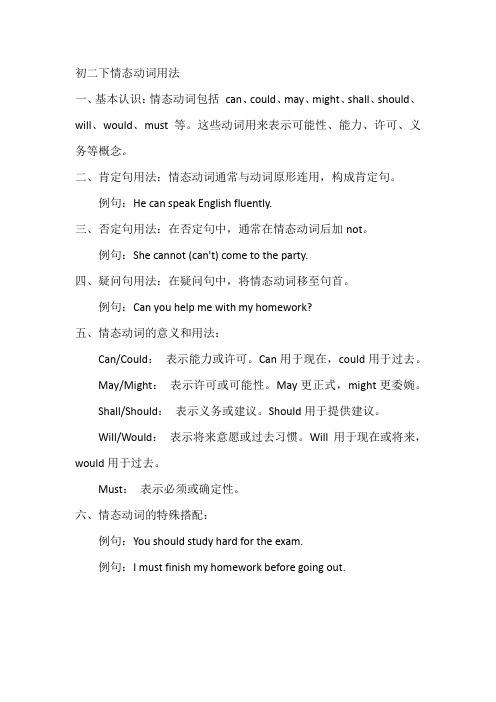
初二下情态动词用法
一、基本认识:情态动词包括can、could、may、might、shall、should、will、would、must等。
这些动词用来表示可能性、能力、许可、义务等概念。
二、肯定句用法:情态动词通常与动词原形连用,构成肯定句。
例句:He can speak English fluently.
三、否定句用法:在否定句中,通常在情态动词后加not。
例句:She cannot (can't) come to the party.
四、疑问句用法:在疑问句中,将情态动词移至句首。
例句:Can you help me with my homework?
五、情态动词的意义和用法:
Can/Could:表示能力或许可。
Can用于现在,could用于过去。
May/Might:表示许可或可能性。
May更正式,might更委婉。
Shall/Should:表示义务或建议。
Should用于提供建议。
Will/Would:表示将来意愿或过去习惯。
Will用于现在或将来,would用于过去。
Must:表示必须或确定性。
六、情态动词的特殊搭配:
例句:You should study hard for the exam.
例句:I must finish my homework before going out.。
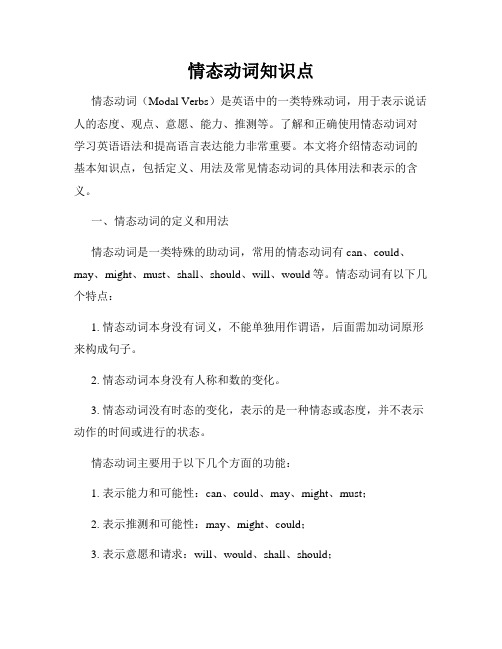
情态动词知识点情态动词(Modal Verbs)是英语中的一类特殊动词,用于表示说话人的态度、观点、意愿、能力、推测等。
了解和正确使用情态动词对学习英语语法和提高语言表达能力非常重要。
本文将介绍情态动词的基本知识点,包括定义、用法及常见情态动词的具体用法和表示的含义。
一、情态动词的定义和用法情态动词是一类特殊的助动词,常用的情态动词有can、could、may、might、must、shall、should、will、would等。
情态动词有以下几个特点:1. 情态动词本身没有词义,不能单独用作谓语,后面需加动词原形来构成句子。
2. 情态动词本身没有人称和数的变化。
3. 情态动词没有时态的变化,表示的是一种情态或态度,并不表示动作的时间或进行的状态。
情态动词主要用于以下几个方面的功能:1. 表示能力和可能性:can、could、may、might、must;2. 表示推测和可能性:may、might、could;3. 表示意愿和请求:will、would、shall、should;4. 表示命令和建议:shall、should、will、would;5. 表示义务和必要性:must、should。
二、常见情态动词的具体用法和含义1. can/could:- 表示能力、技能:I can speak English fluently.- 表示允许:Can I use your computer?- 表示请求:Could you please help me carry this bag?- 表示推测:He could be at home.2. may/might:- 表示允许、请求、建议:May I come in? Might I suggest a different approach?- 表示推测、可能性:She may be busy. It might rain later.- 用于虚拟语气:If I had more time, I might go on vacation.3. must:- 表示必须、肯定:You must follow the rules.- 表示推测、非常有可能:He must be tired.- 表示责任、命令:You must finish the report by tomorrow.4. shall/should:- 表示建议、意愿、命令:Shall we go for a walk? You should see a doctor.- 表示期望、推测:The train should arrive soon.5. will/would:- 表示意愿、决心:I will help you with the project.- 表示请求、邀请:Would you like to join us for dinner?- 表示推测、意愿、假设:She would probably be upset if you didn't go.三、注意事项1. 情态动词后面的动词原形不带to。

常见情态动词讲解 Revised as of 23 November 2020常见情态动词讲解一、情态动词的定义:情态动词有词义,但它不能单独作谓语,它必须和其他动词一起构成谓语。
情态动词没有人称和数的变化;它的后面必须跟动词原形。
二、情态动词的种类:三、情态动词的用法及主要句型:1、Can I help you ——Yes, please. / No, thanks.2、Can + 主语 + 动词原形 Yes, ~ can. No, ~can’t.3、Can I borrow your book----Yes,of course.4、Can I write on the book ------No, you can’t\mustn’t.5、Could \Can you help me---- Yes,of course.\Certainly.\ Sure.6、Could \Can you tell me the way to the Zoo7、May I come in ----- Come in, please.8、May I sit here----- Yes, please.\Sorry, please don’t.9、May I have some Coke---- Yes, of course.10、May/ Could / Can I speak to Tom -----Speaking. Who’s calling11、should 、shouldn’t 表示劝告:1) He should get up early.2) She shouldn’t play computer game too much.12、Should +主语 +动词原形 Yes, ~ should.\ No, ~shouldn’t.13、表示建议“你愿意…吗”---Would you like to go shopping with me---Yes, I’d love to. /I’d love to. But I’m busy now.14、就餐用语Would you like something to eat\drink ----Yes, I’d like…15、shall用于第一人称(I, we), 可以表示“将”和表示建议“……好吗”1) Where shall we have dinner2) Shall we go fishing -----All right. \OK. \Good idea.16、Must + 主语 + 动词原形 ---Yes,~ must.\No, ~needn’t.四.常见情态动词的区别:1. can (could)1)表示能力,could主要指过去时间。
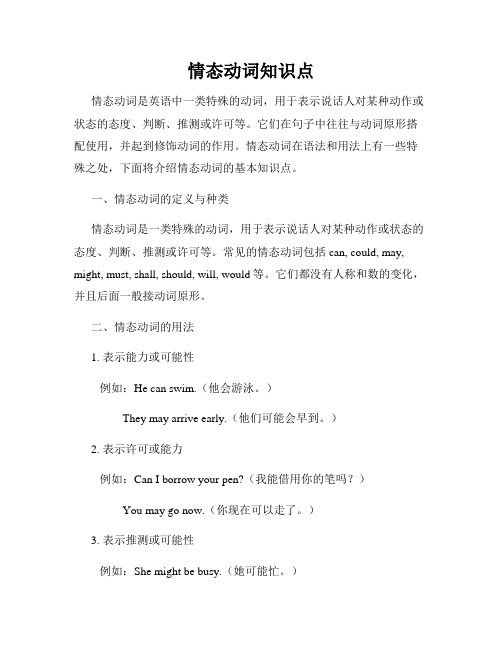
情态动词知识点情态动词是英语中一类特殊的动词,用于表示说话人对某种动作或状态的态度、判断、推测或许可等。
它们在句子中往往与动词原形搭配使用,并起到修饰动词的作用。
情态动词在语法和用法上有一些特殊之处,下面将介绍情态动词的基本知识点。
一、情态动词的定义与种类情态动词是一类特殊的动词,用于表示说话人对某种动作或状态的态度、判断、推测或许可等。
常见的情态动词包括can, could, may, might, must, shall, should, will, would等。
它们都没有人称和数的变化,并且后面一般接动词原形。
二、情态动词的用法1. 表示能力或可能性例如:He can swim.(他会游泳。
)They may arrive early.(他们可能会早到。
)2. 表示许可或能力例如:Can I borrow your pen?(我能借用你的笔吗?)You may go now.(你现在可以走了。
)3. 表示推测或可能性例如:She might be busy.(她可能忙。
)They should arrive soon.(他们应该很快会到。
)4. 表示义务或建议例如:You must finish your homework.(你必须完成作业。
)We should recycle.(我们应该回收。
)5. 表示意愿或请求例如:I will help you.(我会帮你的。
)Would you please close the window?(你能请关窗户吗?)三、情态动词与时态的搭配情态动词本身没有时态,它们与后面的动词共同表达时间和语态的变化。
一般情况下,情态动词后面接动词原形,表示动作或状态的不同时间和语态变化由后面的动词来表达。
例如:- He can play the piano.(他会弹钢琴。
)- He could play the piano.(他过去会弹钢琴。
)- He will be able to play the piano.(他将来会会弹钢琴。

常见情态动词1、can的基本用法⑴表示体力或智力上的能力,即“能够,会”,可与be able to转换。
—Can you play basketball?—No,I can’t.He can speak English.=He is able to speak English.can只有一般现在时和一般过去式;而be able to则有更多的时态。
如:I’ll not be able to come this afternoon.⑵表示许可,主要用于口语,书面语一般用may。
Can we go home now,please?请问我们现在可以回家了吗?You can only smoke in this room.你只能在这个房间里抽烟。
⑶表示推测时(惊讶、怀疑、不相信的态度),常用在疑问句和否定句中。
How can this be true?这怎么可能呢?The news can’t be true.这个消息不可能是真的。
2、may的基本用法⑴表示请求和允许。
You may come if you wish.如果你想来,你就来。
You may not pick flowers in this park.本公园内不许摘花。
一般疑问句肯定回答用can,may;否定回答用can’t(不可以)/mustn’t(禁止)。
—May I smoke in this room?—Yes,you may./—No,you mustn’t.在一般疑问句中might比may语气更委婉,用于有礼貌地提出请求。
Might I use your phone?我可以用一下你的电话吗?⑵用于祈使句,表示祝愿。
May you succeed!祝您成功!⑶表示推测、可能性(不用于疑问句)。
Your mother may not know the truth.你妈妈或许不知道实情。
It may rain tomorrow.明天可能会下雨。

【一轮复习讲义】2024年高考英语高频考点题型归纳与方法总结(新高考通用)第03讲情态动词和虚拟语气(精讲)题型目录一览考点1、情态动词的用法分考点1. 情态动词的基本用法(1)、can, could①、表示能力,意为“能,会”;could表示过去的能力,不表示是否做。
·●She can speak French fluently. 她能讲一口流利的法语。
●Our daughter could walk when she was nine old. 我们的女儿九个月大时就会走路了。
②、can可用于肯定句中,表示客观或理论上的可能性。
● He is confident a solution can be found. 他确信会找到解决办法。
●An experienced teacher can make mistakes. 一位有经验的老师也会犯错。
③、表示请求或允许。
在疑问句中, could可以代替can,语气更委婉,但回答时要用can。
●---Can/ Could I use your bike tomorrow morning?----Yes, you can.---明天上午我可以用你的自行车吗?----是的,可以。
①、表示可能性,意为“可能”,can多用于否定句和疑问句中,could不受限。
can比could语气强。
●He can't be our manager. Our manager has gone to Beijing..他不可能是我们经理。
我们经理已经去北京了。
⑤、表示惊异、怀疑、迷惑等态度,常用于否定句和疑问句中。
● How can you treat me like that? 你怎么能那样对我?⑥、用于固定习语中:can't....too/ enough(无论…也不过分;越…越好);can' but do sth..(不得不做某事,只好做某事);can' t help doing sth...(禁不住做某事)。

情态动词总结知识点归纳情态动词的用法:1. 表示能力和可能性情态动词 can, could, may, might 表示能力和可能性。
例如:She can speak three languages. (她能说三种语言。
)It may rain later. (可能会下雨。
)I might go to the party if I finish my work in time. (如果我及时完成工作,我可能会去参加派对。
)2. 表示义务和必要性情态动词 must, have to 表示义务和必要性。
例如:You must finish your homework before you can go out to play. (你必须在外出玩之前完成作业。
)I have to study for my exams. (我必须为考试而学习。
)3. 表示推测和猜测情态动词 may, might, could 表示推测和猜测。
例如:He may be at home. (他可能在家。
)She might have forgotten about the meeting. (她可能忘记了会议。
)I think it could rain later. (我认为可能会下雨。
)4. 表示请求和建议情态动词 can, could, may, might, will, would, shall, should, ought to 表示请求和建议。
例如:Could you pass me the salt, please? (你能递给我盐吗?)You may want to consider studying abroad. (你可能会考虑出国留学。
)You should stop smoking. (你应该戒烟。
)5. 表示允许和禁止情态动词 can, could, may, might 表示允许,而情态动词 must, shall 表示禁止。

情态动词情态动词(Modal verbs)本身有一定的词义,表示语气的单词。
但是不能独立作谓语,只能和动词原形一起构成谓语。
情态动词用在行为动词前,表示说话人对这一动作或状态的看法或主观设想。
一、1.四大分类①只做情态动词:may, might, must..②可做情态动词又可做实义动词:如:need, dare,can.......③具有情态动词特征:have(had,has) to,used to, ought to④可做情态动词又可作助动词:如:shall(should),will(would)2.具有助动词作用,可以用来构成否定句,疑问句及用于简单回答。
Can you sing English songs?Yes ,I can.他可能迷路了。
我们必须待在这儿。
3.在以Could引导的表示委婉语气的疑问句,常用来表示请求别人帮助或对长辈的请求的。
Could you come to my party on Saturday afternoon?)Yes,I can./Sure./Certainly.Sorry,I am afraid not.4.情态动词无人称和数的变化,情态动词后面跟的动词须用原形,否定式构成是在情态动词后面加 "not"。
个别情态动词有现在式和过去式两种形式,过去式用来表达更加客气,委婉的语气,时态性不强,可用于过去,现在或将来。
情态动词属非及物动词,故没有被动语态。
He could be here soon. 他很快就来。
We can't carry the heavy box.5.基本助动词与情态助动词最主要的区别之一是:基本助动词本身没有词义,而情态助动词则有自己的词义,能表示说话人对有关动作或状态的看法,或表示主观设想:What have you been doing since?I am afraid I must be going.You may have read some account of the matter.6.除此之外,情态助动词还有如下词法和句法特征:除ought和used和have to以外,其他情态动词后面只能接不带to的不定式。


(完整版)情态动词知识点总结什么是情态动词情态动词(Modal verb)是一种特殊的动词形式,用来表示说话人对某种行为、情况或可能性的态度、观点、意愿、能力等。
情态动词可以用来构成陈述句、疑问句、否定句、建议句等。
常用的情态动词及其用法1. Can:表示能力、许可、可能性、请求等。
Can:表示能力、许可、可能性、请求等。
- 表示能力:I can swim.(我会游泳。
)- 表示许可:Can I use your phone?(我可以用一下你的手机吗?)- 表示可能性:He can be late.(他可能会迟到。
)- 表示请求:Can you help me?(你能帮我吗?)2. Could:表示过去的能力、请求、建议等。
Could:表示过去的能力、请求、建议等。
- 表示过去的能力:When I was young, I could run faster.(我年轻的时候,跑得更快。
)- 表示请求:Could you please pass me the salt?(你能给我递一下盐吗?)- 表示建议:You could try using a different approach.(你可以尝试用一种不同的方法。
)3. May:表示可能性、许可、祝愿等。
May:表示可能性、许可、祝愿等。
- 表示可能性:It may rain tomorrow.(明天可能会下雨。
)- 表示许可:May I use your bathroom?(我可以使用你的卫生间吗?)- 表示祝愿:May you have a happy birthday!(祝你生日快乐!)4. Might:表示可能性、建议、推测等。
Might:表示可能性、建议、推测等。
- 表示可能性:She might be at home.(她可能在家。
)- 表示建议:You might want to consider another option.(你可以考虑另一个选项。
情态动词对比精讲一、can,could & be able to1.cana. 表示能力(ability)时,指在脑力或体力方面所具有的能力;can只表示一般现在时,要表示其他时态,要用be able to,它可以用在一般现在时、一般过去时、一般将来时、过去将来时、现在完成时及过去完成时等时态。
Eg. By the time he finishes his courses, he'll be able to get good marks.EX. I talked for a long time, and in the end I __________ 10% off the price. Which isimproper?A. succeeded in gettingB. managed to getC. was able to getD. could get* 表示具体的某一过去的能力,或完成过去某件事的能力,这就和succeed in doing及manage todo 意义时一样的,即动作已完成。
Eg. He was able to go to the party yesterday evening and he enjoyed himself very much.b. 表示可能性(possibility)EX. Tourism _________ help a country promote the friendship with other countries, but too muchtourism _________ create problems.A. may … shouldB. might … mayC. can … canD. shall … may*Can 一般只指理论上的可能性,而may & might 表示将发生或正在发生的实际性的可能性。
Eg. One can travel to Qingdao by boat, by train or by air.I may fly to Beijing next week.c. 表示允许(permission),表示"可以"时,在口语中代替may,表示许可;can't表示"不准"时,相当于mustn'tEg. Perhaps we can go out for a walk.You can’t pick flowers in this park.d. could 表示请求,语气较委婉,主要用于疑问句,条件句Eg. Could you lend me some money?Yes, I can. / No, I’m afraid not.[考题回顾]1.The fire spread through the hotel very quicklybut everyone ________ get out.(NMET97)A. had toB. wouldC. couldD. was able to2. Mr Bush is on time for everything. How___________ it be that he was late for theopening ceremony? (2001上海)A. canB. shouldC. mayD. must3. If I ___________ go with you, I should feel veryglad.A. canB. couldC. shouldD. may4.-I stayed at a hotel while in New York.-Oh, did you? You ___________ withBarbara.(NMET'98)A. could have stayedB. could stayC. would stayD. must have stayed5.My sister met him at the Grand Theatreyesterday afternoon, so he ___________ yourlecture.(2000上海)A. couldn't have attendedB. needn't have attendedC. mustn't have attendedD. shouldn't have attended(Key:DABAA)二、shall, should & ought to1. shallEx. The new regulation _________ take effect on September 1st in cities all over the country.A. canB. shallC. couldD. woulda. 用在法律、条约、规章、等文件中表示规定,作“应该,必须”解,一切人称都可。
Eg. Each citizen shall carry his identification card when traveling.b. 用于第二,第三人称,表示说话人给对方的命令、警告、允诺或威胁。
Eg. You shall fail if you don’t work harder. ( warning) He shall have the book when I finish reading it. ( promise)He shall be punished. ( threat)c. shall 用于疑问句,表示征求对方意见。
Eg. What shall we do this evening?Shall he start at once or wait for a while?2. should = ought toa. 表示"应该"、"应当",指有责任或义务做某事eg. You shouldn’t spend so much of your spare time in websurfing.Such things ought not to be said before children. Ex. I’m terribly sorry that they _________ think I did it on purpose.A. couldB. mightC. mustD. shouldb. should 用于含有surprising, amazing, shocked, sorry, ashamed等词的从句,描述个人对事件的反应,意为“竟然,竟会”eg. I find it quite astonishing that he should be so rude to you.It is a pity that you should be so careless.[考题回顾]1. There was a lot of fun at yesterday's party.You ___________ come, but why didn't you?A. must haveB. shouldC. need haveD. ought to have2. It's nearly seven o'clock. Jack ___________ be here at any moment.(NMET'95)A. mustB. needC. shouldD. can3.-When can I come for the photos? I need themtomorrow afternoon.-They ___________ be ready by 12:00.(NMET'98)A. canB. shouldC. mightD. need4. ___________ it rain tomorrow, you would have to put off the visit to the Yangpu Bridge.A. WhereB. ShouldC. WouldD. Will5.One ought ___________ for what one hasn't done.A. not to be punishedB. to not be punishedC. to not punishedD. not be punished(Key:DCBBA)三、must & have to1.musta. 表示"必须"、"应该",指主观上认为应该做某事;或表示肯定性,必然性。
Eg. According to the local regulations, anyone whointends to get a driver’s license must take on an eye test.Don’t bet on horse race; you must lose in the long run.EX. My elder brother was really annoying, and he ________ choose the day I had an appointment to start to repair the garden fence.A. mightB. shouldC. couldD. mustb. must 多用于第二人称,意为偏要,硬要,或固执和不巧的意思。
Eg. The car must break down just we were starting our holiday.2.have to表示"不得不"、"必须",指在客观条件下必须去做某事,多是被动的;Eg. The play is not interesting, I really must go now.I had to work when I was your age.[考题回顾]1. I didn't hear the phone. I ___________ asleep.A. must beB. must have beenC. should beD. should have been2. .Johnny, you ___________ play with the knife, you ___________ hurt yourself.(NMET'96)A. won't; can'tB. mustn't; mayC. shouldn't; mustD. can't; shouldn't3. Put on more clothes. You ___________ be feelingcold with only a shirt on.A. canB. couldC. wouldD. must4. You ___________ walk for miles and miles amongthe hills without meeting anyone.A. mustB. needC. mayD. should(Key:BBDA)四、may与might1.mayEX. --- Sorry to interrupt you, but ________ I excuse myself for a while ?--- Yes, of course you __________.A. should … mayB. might … couldC. could … couldD. may … cana.表示"允许"、"请求" ( permission),常用于疑问句;= be allowed toEg. May I use your pen ? Yes, you may / can.Ex. We’re got lost. We _______ where we are.A. may well stayB. had better to stayC. may as well stayD. might as well stayed* Might / may as well + 动词原形,解释为“还是。